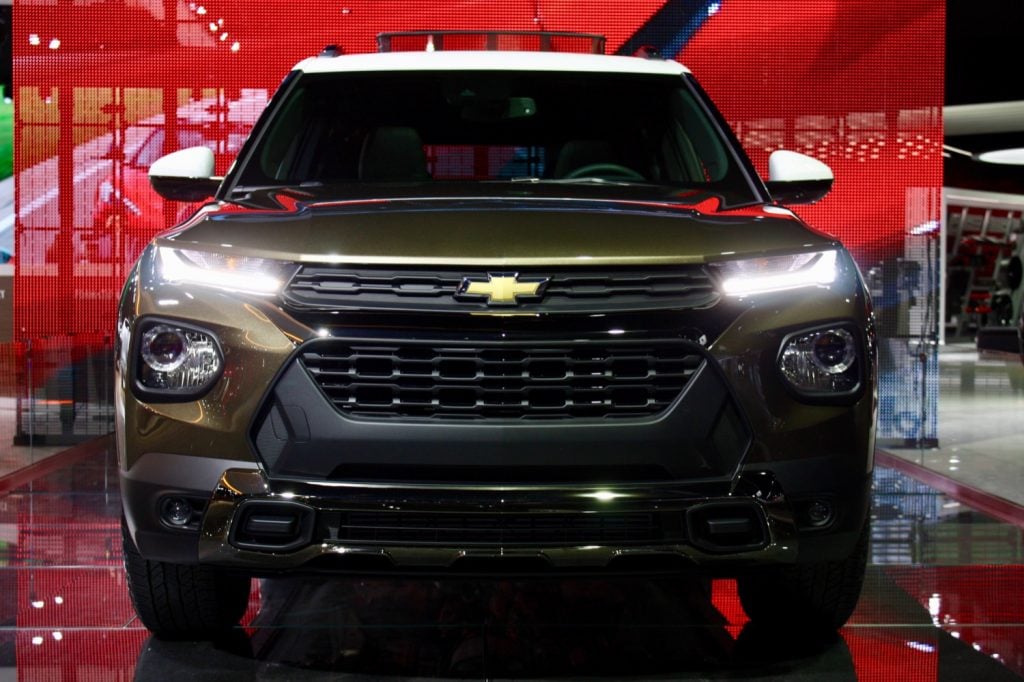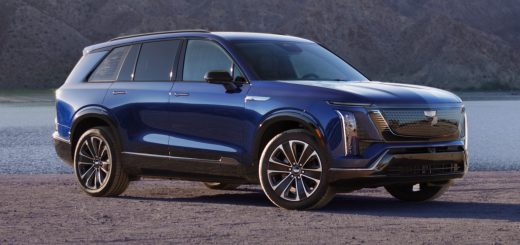Back in November of 2019, the 2021 Chevrolet Trailblazer made its big North American debut at the Los Angeles Auto Show, showing stateside after an initial unveiling earlier in the year. The new crossover slots in between the subcompact Chevrolet Trax and compact Chevrolet Equinox in the Bow Tie brand’s stable, and offers two engine options, both of which are turbocharged three-cylinders. Unsurprisingly, some have criticized the Trailblazer for offering “too few cylinders,” but how do these two engines really stack up? To find out, we’re comparing them to the four-cylinder offered in the Chevrolet Trax.
To note, the new Trailblazer could be viewed as an indirect replacement for the Chevrolet Trax, although both models will coexist in the U.S. and Canadian markets for now.
Indeed, Chevrolet could have elected to equip the new Trailblazer with a four-cylinder, but chose to offer a pair of turbo three-cylinders instead. These include the base-level 1.2L LIH, which is tuned to produce 137 horsepower and 162 pound-feet of torque – roughly the same power as the turbocharged 1.4L inline LUV four-cylinder found in the 2020 Chevrolet Trax, but with an extra 14 pound-feet of torque added on top.
| Vehicle | 2020 Trax | 2021 Trailblazer |
|---|---|---|
| Engine | 1.4L I-4 Turbo LUV | 1.2 I-3 Turbo LIH |
| Power (hp / kW @ RPM) | 138 / 103 @ 4900 | 137 / 102 kW @ 5000 |
| Torque (lb-ft / Nm @ RPM) | 148/ 199.8 @ 1850 | 162 / 219 @ 2500 |
To note, the 1.4L LUV inline four-cylinder is considered a rather archaic engine, and doesn’t even come with direct injection. The LUV ‘four can be traced back to 2011 and the first-generation Chevrolet Cruze and current-generation Chevrolet Sonic.
That said, the 1.4L LUV inline four-cylinder is currently the only engine on offer with the Chevrolet Trax, unlike the latest Trailblazer, which also offers an uplevel powerplant in the form of the turbocharged 1.3L L3T three-cylinder.
| Vehicle | 2020 Trax | 2021 Trailblazer |
|---|---|---|
| Engine | N/A | 1.3 I-3 Turbo L3T |
| Power (hp / kW @ RPM) | N/A | 155 / 115 @ 5600 |
| Torque (lb-ft / Nm @ RPM) | N/A | 174 / 236 @ 1500 |
Although some will no doubt continue to criticize the 2021 Chevrolet Trailblazer solely on cylinder count, the specs tell a more complete story.
Subscribe to GM Authority for more Chevrolet Trailblazer news, Chevrolet Trax news, Chevrolet news, and around-the-clock GM news coverage.
















Comments
all of those premium brand buyers are going to celebrate when they find out their buick encore gx engine is better than a trax.
buick is killing it!!!!
Looks like a bad little version of a Toyota FJ.
What if Chevrolet thinking.???
Aside from a white roof I see absolutely zero resemblance between the Trailblazer and a FJ…like nothing, it’s not even close.
Exactly… you get a prize x3 🖕🖕🖕
That’s one of the many reasons it should be called anything but a Trailblazer… what trail can that thing blaze ? Subaru would do better…
FJ has a heritage, Subaru also….
Scott, GM is thinking this–“Let’s bring in the small 3 cylinder engine we build in Turkey and put them in U.S. built cars.” GM gets local tax breaks in Turkey for expanding business over there where the workers get paid less money than Mexico based workers. By the way, the small Chevy cars in Turkey are mostly factory installed with propane fuel system because LPG propane costs less than half the pump price of gasoline there. Even the full size dodge van is made in Turkey and shipped to North America. They are sold in Europe as Fiat vans, same vehicle but with a different gas engine and the same diesel engine option.
You poor sods with your port fuel injected engines that never need to have your intake ports manually cleaned….poor primitive souls!
Most of the new engines have been converted to have a oil collection system that puts the oil back into the oil system not the intake.
Carbon issues have not been a problem on most 2017 and later models.
I have not seen the details on the new engine here but I expect it also is using the new system.
That’s why I bought a Corolla HB with direct and port injection.
I am curious about the gas mileage – it would be interesting to see a comparison between the old 1.4 and the new 1.2/1.3
Low end torque is the most important thing for gas mileage, because the sooner your transmission upshifts to the next gear with enough torque, then the mileage will be better. Obviously about 25 to 50 percent of all driving is close to idle speed or very low RPM in city stop and go driving or urban speeds below 50 MPH. The 3 banger will show up the larger 4 banger in that type of driving every time. GM even put a very high pressure turbo on the 1.4 liter gas engine for another country, i forget which country it was. They thing put out over 330 HP.
The old 2010 era 138 HP 1.4T shouldn’t even still exist, especially in the heavier Trax and Encore. The fact that they invested in upgrading the 1.4T with DI and more power and torque only to completely drop it just shows how clueless GM really is and how some things never change.
Here are some suggestions for next year. Granted, at this time it’s not known what the dimensions are under the hood (bonnet) but, here’s what I’d like to see in future models.
RST. Powered by a 1.5 L (LFV) or 1.6 L (LWC) AWD
SS Powered by a 2.0 L (LSY) AWD ( Buick Encore GXT and GMC Typhoon)
These would require suspension stiffing to different degrees, and some interior upgrades to match.
1.5 L. https://gmauthority.com/blog/gm/gm-engines/lfv/
1.6 L https://gmauthority.com/blog/gm/gm-engines/lwc/
2.0 L https://gmauthority.com/blog/gm/gm-engines/lsy/
GM Performance ball is your court.
It’s a good engine: I’ve driven a Trax across Colorado and down into Arizona without the car ever feeling underpowered AND got good gas mileage.
Star
That’s all down hill, just look at a map…
How about uphill ???
Hahahaha
Just bought a Equinox and stepped up to get the 2.0 L turbo . Don’t know about the rest of you but I want a little get up and go once in awhile and the 1.3 ,1.4 and 1.5 Just Don’t cut it !!! We are getting an average of around 27.8 miles per gallon ( combo Hi-way /city ) and that is good enough for me . The POWER is worth it !